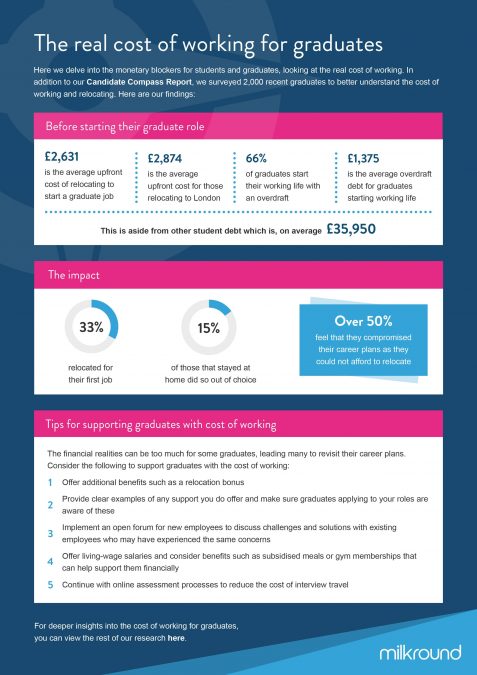The cost of working for graduates
We share out latest research into how much it costs for graduates to relocate when stepping into the world of work. We also offer tips on how employers can better support graduates financially.

Our research has unveiled that due to the expenses associated with leaving home to find work, only a third (33%) of graduates will leave their hometown to find their first job, resulting in degree-holders abandoning their first-choice careers, declining job interviews and accepting reduced salaries.
The ‘Cost of First Job’ report, found that the UK’s high cost of living was compromising graduate ambitions, both in terms of chosen careers and salary. Of the 2,000 recently graduated students surveyed, only 33% relocated to find their first job, while 40% returned to live with family and 20% stayed in their University town.
Key findings included:
- Only 15% of those that stayed at home did so out of choice, with 50% saying they did so to save money to start their careers, while a further 35% simply said they could not afford the cost of living anywhere else
- Over half (53%) feel that they compromised their career plans as they could not afford to relocate. These compromises included:
- Settling for a job they did not particularly want (14%)
- Accepting a lower salary than they hoped for (13%)
- Nearly a quarter (23%) either declined a job offer, or completely changed the industry they had hoped to work in
- And of those that did relocate, nearly 90% did so for financial reasons:
- 42% accepting a job they were already offered
- 21% proactively moved to an area that offered higher salaries
- 20% move to an area known for strong long term career prospects for their chosen industry
- A quarter of graduates said they are now looking to move abroad within five years and 77% agree that there are more job opportunities if you relocate to a big city
- 84% of graduates said they struggled financially in the first months of their relocation of which:
- Only 29% were able to move straight into permanent accommodation (dropping to 14% in London),
- Whilst 21% initially stayed with a friend, 15% shared a friends bed, 15% stayed in hostels and 12% admitted to sofa-surfing
- After the relocation costs, comes the living and eating costs which showed some had taken to extreme measures to be able to afford food. 14% have skipped meals because they could not afford to eat, 11% have used local foodbanks and 11% even shared they have gone on dates with a higher earner to secure free food and drinks.
Our report also outlines that the average student leaves University with an overdraft of -£1,375.40 (excluding load repayments), a figure that is made more significant when the average student is spending £1,580 to relocate to a new city, costs they incur before receiving their first salary payment.
To cover these costs, 38% cited they received financial support from their parents, 36% said they used their life savings and a further 31% used money from their current account. With many companies focusing on improving diversity and inclusion in the workplace, it’s important to take into account the cost of relocating for graduates.
Tips on how you can better support young talent financially:
1. Offer graduates an upfront payment for joining
From our research, 24% of graduates stated that this is how they would like to be supported.
This can be put towards anything that will support their new role, whether it’s relocating/commuting/paying for a new wardrobe or helping them with monthly costs.
2. Help to pay their first month’s rent
22% stated that helping to pay their first month’s rent would ensure they felt fully supported
3. Support graduates with their rental deposits
21% requested support in paying for their rental deposit on a new house/flat, to help them relocate
4. Include a bonus for relocation travel costs
16% said this would make them consider relocating for their graduate job
5. Ensure you are offering workplace incentives as part of a starting package
93% of graduates said that the top 5 incentives for motivating them to relocate would be: pension schemes, private healthcare, career breaks, gym membership and paid volunteering days.

